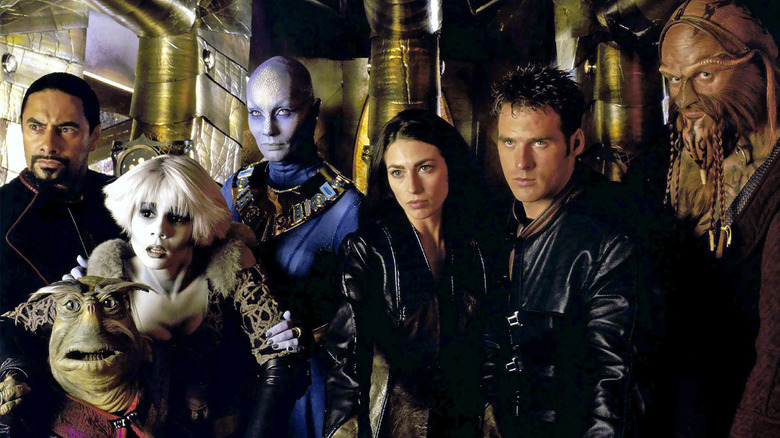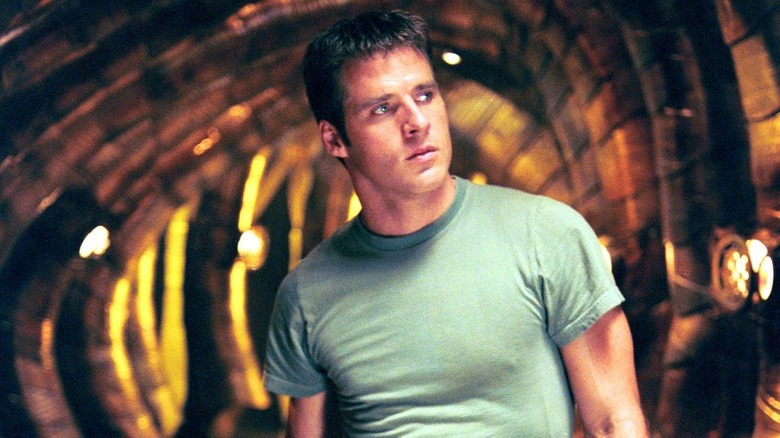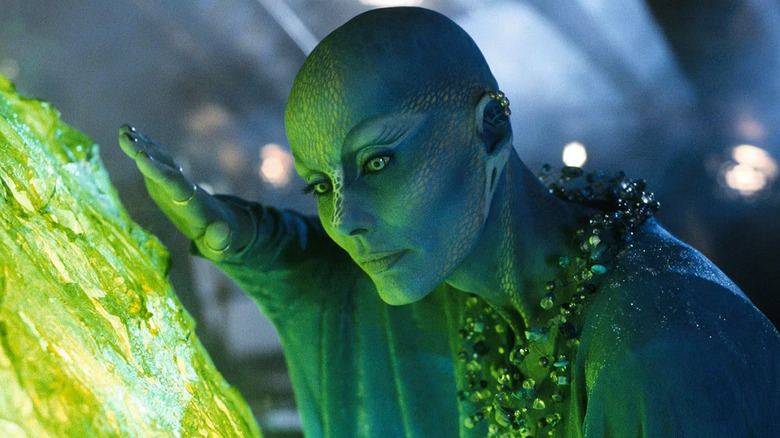How The Sci-Fi Series Farscape Set Out To Do The Opposite Of Star Trek
A handsome American ends up stranded on an alien ship, manned by an unusual alien crew, where he falls in love with its resident warrior woman. It's not "Guardians of the Galaxy," it's "Farscape," the Australian-American sci-fi series! The series was created by Rockne S. O'Bannon and Brian Henson with alien designs courtesy of the Jim Henson Company, including several puppets that served as central characters. "Farscape" is funny, campy, and weird as hell, setting it apart from not only its television contemporaries but all other sci-fi shows. "Farscape" ran for four seasons from 1999-2003, and while it wasn't as popular as some of the other big sci-fi shows, it has a devoted cult following that really loves it.
In a retrospective for the show's 25th anniversary at IGN, Henson shared his inspiration for the show and what he and O'Bannon were trying to do with "Farscape." With its wacky cast of characters and often goofy tone, "Farscape" was the anti-"Star Trek," and it turns out that was the point. "Farscape" was less interested in things like examining terrorism through different lenses and more interested in the personal ramifications of surviving while traveling the stars, from some very different perspectives.
Farscape set itself apart through its characters
In the retrospective, Henson explained that in the late 1990s when they were developing "Farscape," they felt the need to break away from the biggest sci-fi shows on the air, especially "Star Trek":
"What we were trying to do back then was kind of break the mold. The biggest show was 'Star Trek,' for sure. And 'Star Trek' had taken a vision of the future where people are in much more control of their emotions, and they're more efficient in their communication. They feel like an elevated human being when you watch people interacting on the 'Star Trek' shows. We really wanted a completely different feel and tone."
Around the time "Farscape" was being developed, "Star Trek: Deep Space Nine" and "Star Trek: Voyager" were both on the air, with "Star Trek: The Next Generation" having freshly made the leap from the small screen to the cineplex. The crew aboard Moya in "Farscape" are pretty far removed from characters like the incredible military hero Ben Sisko from "Deep Space Nine" or the brilliant diplomat Jean-Luc Picard from "Next Generation." Despite most of them being aliens of some sort, they're all very relatable and very, very human.
A found family of intergalactic hot messes
Each of the folks aboard Moya has their unique strengths and flaws, though none of them have the kind of "elevated" attitudes Henson describes save for maybe Zhaan (Virginia Hey), a telepathic empath, but even she's kind of (maybe) a terrorist. Human John Crichton (Ben Browder) is a smart-alecky pop-culture fanatic who is a total dummy as frequently as he is clever, like Captain Kirk without the political idealism or the excess libido, and he helps usher the audience through this bizarre, beautiful universe. "Farscape" is delightfully weird and silly and horny with regularity instead of only allowing itself that freedom in holodeck episodes, with characters who are often comedically flawed in some way. Even the character most generally competent and adept at surviving, Aeryn Sun (the always incredible Claudia Black), starts the series exceptionally cold and kind of xenophobic, though she grows over the course of the show.
"Farscape" doesn't have the same kind of utopian idealism as "Star Trek," with characters who strive to be the best versions of themselves. Instead, everyone is simply trying to get by for another day and maybe find a bit of comfort in the cold dark of space. It's extremely relatable, even if the idea of staying aboard an organic, living ship that eventually gets pregnant is not. It's okay Moya, we love you and your lil' starfighter baby. Enterprise, eat your heart out.


